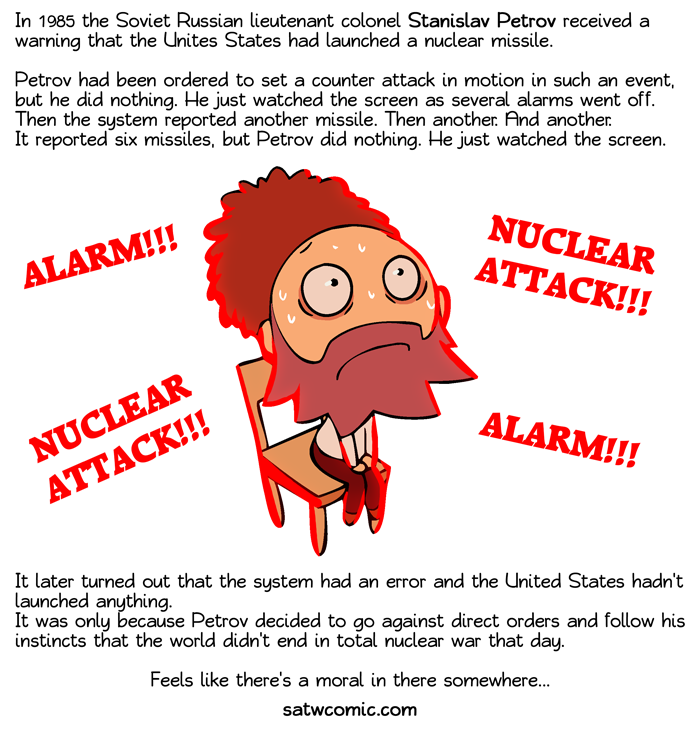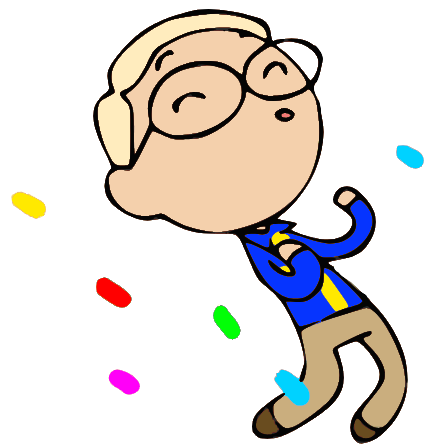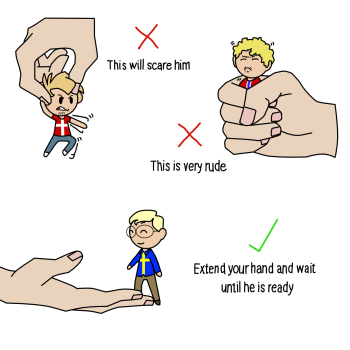
Thank you so much Petrov
Not much of a comic or joke today because I hurt my shoulder yesterday.
Russia
19th April 2018
8 years ago #9754519
13
0
There needs to be a public holiday in every country dedicated to this man. And also to Vasili Arkhipov, the vice-captain of a soviet nuclear sub, who vetoed the decision to launch a nuclear torpedo at a US ship during the Cuban Missile Crisis.
It's truly amazing that we're all still here after all that's happened.
If the both of you are somehow reading this, humanity is eternally in your debt. Thank you.
It's truly amazing that we're all still here after all that's happened.
If the both of you are somehow reading this, humanity is eternally in your debt. Thank you.
8 years ago #9754282
10
0
More specifically, Petrov instantly found it weird that only a single "missile" was detected. A first strike would've involved dozens or hundreds of missiles, which is why he waited and watched.
What's really scary is that there were several near misses that could've started a nuclear war, from human error to weather to bears.
What's really scary is that there were several near misses that could've started a nuclear war, from human error to weather to bears.
6 years ago #9826794
6
0
His logic was that if America were actually going to fire their nukes it would be all of them and not just a few. Which makes sense
8 years ago #9755864
6
0
Fucking hell. I'm an American, and I owe this Russian my existence. Thank you Mr. Petrov.
8 years ago #9754795
6
0
Dear humon, thank you for always making funny comics with some historical information .. Get well soon.. 

8 years ago #9754683
6
0
It gets much worse in context. Pretty much all of 1983 was building up to to a crescendo and frankly the most astonishing thing is that the year ended without a nuclear war starting. History time!
Reagan's evil empire speech, the launch of SDI (conceptual space-based weapons to shoot down Soviet nukes, aka Star Wars), the space shuttle, the B-1 and B-2 programs, the impending deployment of the Pershing II missiles to Germany which the Soviets thought meant Moscow could be hit in as little as 8 minutes, all scared the heck out of the Soviets, who were already paranoid and suspected that the west was going to launch a nuclear war, it was only a matter of when it would happen, and could they preempt NATO and launch first. Then this event. But to make matters worse, the flaw wasn't discovered until 6 months later (turns out light reflected off a cloud over Nebraska- a stupid mistake that had been noted during construction but ignored so they could meet the deadline). The real problem to Soviet leaders was not that their toys were broken, but that their men were inclined to ignore their orders- can they rely on them during a real crisis?
A month later the US invaded Grenada, then a few weeks later began Autumn Forge 83 which was a massive troop readiness training course, which ended with simulated nuclear launches (Able Archer 83). The Soviets knew about the exercises, but weren't sure if they were simply exercises or buildups to a real invasion (Soviet strategy was based on this ruse, they almost invaded Poland in 1981 with the guise of a training exercise, ZAPAD-81). They actually had planes on standby ready to take off in case NATO started moving real equipment around. This whole time they didn't know if they had a faulty launch detection system or if their men could be relied on to do their jobs.
Reagan's evil empire speech, the launch of SDI (conceptual space-based weapons to shoot down Soviet nukes, aka Star Wars), the space shuttle, the B-1 and B-2 programs, the impending deployment of the Pershing II missiles to Germany which the Soviets thought meant Moscow could be hit in as little as 8 minutes, all scared the heck out of the Soviets, who were already paranoid and suspected that the west was going to launch a nuclear war, it was only a matter of when it would happen, and could they preempt NATO and launch first. Then this event. But to make matters worse, the flaw wasn't discovered until 6 months later (turns out light reflected off a cloud over Nebraska- a stupid mistake that had been noted during construction but ignored so they could meet the deadline). The real problem to Soviet leaders was not that their toys were broken, but that their men were inclined to ignore their orders- can they rely on them during a real crisis?
A month later the US invaded Grenada, then a few weeks later began Autumn Forge 83 which was a massive troop readiness training course, which ended with simulated nuclear launches (Able Archer 83). The Soviets knew about the exercises, but weren't sure if they were simply exercises or buildups to a real invasion (Soviet strategy was based on this ruse, they almost invaded Poland in 1981 with the guise of a training exercise, ZAPAD-81). They actually had planes on standby ready to take off in case NATO started moving real equipment around. This whole time they didn't know if they had a faulty launch detection system or if their men could be relied on to do their jobs.
8 years ago #9754375
5
0
to be more percise- that desicion came because Petrov had 2 big reasons to doubt that computers were correct.
1- that computer system had had some issues prior to that
2- By his estimates, americans wouldnt have launched so few missles.
Therefore he decided to wait until radars confirmed missles, although at that point it wouldve been too late to retaliate. His gamble paid off
1- that computer system had had some issues prior to that
2- By his estimates, americans wouldnt have launched so few missles.
Therefore he decided to wait until radars confirmed missles, although at that point it wouldve been too late to retaliate. His gamble paid off
8 years ago #9754365
5
0
Bigger hero was Vasili Arkhipov.
During the Cuban Missile Crisis, or really the Cuban portion of the Turkey Missile Crisis (I'll explain later), Vasili was in charge of the submarine fleet. His sub was outfitted with a nuclear torpedo. It came under fire from the Americans; yes we opened fire on the Russians during the crisis. He was too deep to use the radio, and everyone aboard thought WWIII had already begun. To launch a nuclar strike, a unanimous decision needed to be made by him, the captain, and the political officer. He was the only one who voted no. Luckily, it turned out the depth charges were dummies, but inside the sub, there's no way to tell.
As for why the Turkey Missile Crisis, the whole thing started when Kennedy decided to place a battery of nuclear missiles in Turkey. This pissed off the Russians for good reason, and when diplomacy failed they did the same to the US. The result of the crisis was that the missiles were removed from Turkey, so technically, the Russians won the crisis. But the Americans got what they wanted too, so they won. But the crisis humiliated Russia in the eyes of the Chinese, so Russia actually lost. Whereas the crisis made De Gaulle convinced that the Americans would never help France when push came to shove, because they wouldn't help Cuba, so America lost the crisis too. Everyone got what they wanted, and still lost.
During the Cuban Missile Crisis, or really the Cuban portion of the Turkey Missile Crisis (I'll explain later), Vasili was in charge of the submarine fleet. His sub was outfitted with a nuclear torpedo. It came under fire from the Americans; yes we opened fire on the Russians during the crisis. He was too deep to use the radio, and everyone aboard thought WWIII had already begun. To launch a nuclar strike, a unanimous decision needed to be made by him, the captain, and the political officer. He was the only one who voted no. Luckily, it turned out the depth charges were dummies, but inside the sub, there's no way to tell.
As for why the Turkey Missile Crisis, the whole thing started when Kennedy decided to place a battery of nuclear missiles in Turkey. This pissed off the Russians for good reason, and when diplomacy failed they did the same to the US. The result of the crisis was that the missiles were removed from Turkey, so technically, the Russians won the crisis. But the Americans got what they wanted too, so they won. But the crisis humiliated Russia in the eyes of the Chinese, so Russia actually lost. Whereas the crisis made De Gaulle convinced that the Americans would never help France when push came to shove, because they wouldn't help Cuba, so America lost the crisis too. Everyone got what they wanted, and still lost.
8 years ago #9755872
4
0
To anyone wondering /why/ he did that, tl;dr he correctly guessed that 6 missiles was far too few to be a real attack. https://en.wikipedia.org/wiki/1983_Soviet_nuclear_false_alarm_incident
Add comment: Please Sign in or create an accout to comment.



 Support the comic on
Support the comic on 

































28
Suddenly, sattelite reported about six launches from US base. The normal procedure was to immediately report to upper echelons, but Petrov suspected that something is wrong, because just six "Minuteman" missiles simply could not inflict enough damage to work as effective first-strike attack. So, he asked the radar stations (which should detect the missiles as soon as they rise over the horizon), and they reported nothing. Optical sattelite, aimed at this area, also reported no engine flares, so Petrov became convinced that this is a false alarm and ordered to stand down.
Eventually, it was discovered that sattelite optics was aligned imperfectly, and bright solar rays, rfeltected from high-altitude clouds, accidently gave infrared signatures, which corresponded with missile launches.
P.S. And Petrov could not "set a counter strike in motion". He was only supposed to rely the data to higher echelons, who would make a decision about what to do next.